As a mentor, Guzzone, who majored in communication and media studies and minored in theater, has been paired with students interested in similar fields. This year’s application deadline is September 28, and in early October, the program team will pair undergraduates with alumni for one-on-one mentorship throughout the academic year.
“It’s been really awesome to give back, especially since I found my career path through my courses and my major at Fordham,” said Guzzone, now a senior development manager at the New York City-based Crime Victims Treatment Center. “I really enjoy being a part of that and … getting to work with students who are interested in either communications or maybe specifically nonprofit” organizations.
Alumni and students agree to a 24-hour time commitment, which includes events, surveys, and goal setting, in addition to their one-on-one interactions. The program is part of the Fordham Mentorship Network, which also provides alumni with opportunities to share advice with current students through a “flash mentoring” tool.
Last academic year, the network facilitated more than 1,300 alumni–student mentoring connections—something that may have helped Fordham earn a spot on Town & Country magazine’s list of colleges with the “best alumni networks.”
All NYC Has to Offer
Guzzone, who said she has been interested in theater, dance, and performing for as long as she can remember, didn’t think twice about applying to Fordham when an admissions counselor visited her high school in Washington Township, New Jersey. (In fact, she said, her mother had to force her to apply to any other schools just in case she didn’t earn admission to Fordham.)
“Being able to be in the neighborhood that Lincoln Center is in, to be so close to all of the theater and dance and … [to]have the opportunity to continue doing some shows as a student was just really, really attractive to me,” she said.
Guzzone joked that although the Lincoln Center campus didn’t necessarily resemble what you’d see in “a movie about college”—unlike Fordham’s Rose Hill campus, which has played that role numerous times—her experience at the University’s Manhattan campus really embodied a sentiment familiar to almost every member of the Fordham community.“I remember during our time, they would always say, ‘New York is my campus. Fordham is my school,’ and I think that was really apparent,” she said. Things like exploring the Upper West Side, catching a baseball game, or stopping by a farmers market “and really immersing ourselves in everything that the school was offering through the city was really awesome.”
Though the University has changed in many ways since she graduated, Guzzone said that serving as a mentor allows her to stay connected and abreast of what’s happening on campus.
“A lot of the professors that I had are not there anymore. … There are new buildings that didn’t exist, but it seems like, at the same time, the core Fordham values are very much still apparent, and the experiences are still pretty similar, which is cool.”
Remembering Casey Feldman
During her first year at Fordham, Guzzone met Kelsey Butler, Christina Halligan Asaro, Callie Fisher Hall, and Casey Feldman. The women lived together through their junior year, 2009, when Feldman was tragically killed in a car accident by a distracted driver. Guzzone said she and her roommates helped plan a memorial for Feldman at the time.
Today, Guzzone serves as a board member of the Casey Feldman Foundation, which Feldman’s parents established shortly after she died. “It’s really a gift, I think, that her parents have allowed us to continue to be involved and to really help her memory be carried on,” she said.
Fordham Five
What are you most passionate about?
I’m passionate about connection—whether it’s through mentorship or hosting a big dinner party for friends and family. Having the opportunity to connect with so many different people is the best part of working in fundraising, too, in my opinion. Meeting with donors, hearing why they’re passionate about our work [at the Crime Victims Treatment Center], collaborating with funders, building relationships: It all boils down to connecting with people on a personal level, and I love it!
What’s the best piece of advice you’ve ever received?
Always be kind. You never know what someone else is going through, and a smile or nice gesture can go a long way.
What’s your favorite place in New York City? In the world?
It may be cliché, but my favorite place in New York City is Central Park. I have so many amazing memories from my Fordham years—picnicking in Sheep Meadow, waiting in line for free Shakespeare in the Park at the Delacorte, trying (and failing!) to ride my bike—and I still love to visit the park today with my dog or go for a run.
I’ll also always be a Jersey girl at heart, and nothing beats a beautiful summer day on the Jersey shore.
Name a book that has had a lasting influence on you.
I love to read, so it’s so hard to pick just one! Anything by Nora Ephron will always be top of the list. She’s such an iconic author and feminist and is a quintessential read. My guilty pleasure is also any mystery or thriller stories—I’ve been known to stay up way too late trying to find out the ending!
Who is the Fordham grad or professor you admire most?
Brian Rose! He introduced me to the world of communications when I wasn’t really sure what I wanted to major in, and he really helped me set the course for what would become my career.
I still use lessons from the internship seminar he taught in my work today—and definitely pass his advice on to my mentees.
]]>Auster joined the Department of Communications and Media Studies as a visiting assistant professor in 1996. He was appointed full professor in 2015, a position he held until he retired in 2020. He served as associate chair of the department at the Rose Hill campus from 2002 to 2003, and from 2003 to 2008 at the Lincoln Center campus.
Auster was born in Brooklyn, grew up in the Bronx, and graduated from City College in 1961. He earned a Ph.D. in history from S.U.N.Y. Stony Brook in 1981, and taught at Brooklyn College and SUNY College at New Paltz from 1982 to 1995 before joining the Fordham faculty.
At Fordham, he focused on film and television. He published several books, including American Film and Society Since 1945 (ABC-Clio, 2018), thirtysomething: Television, Women, Men and Work (Lexington Books, 2008), Turn On, Tune In… Television and Radio in the U.S.A. (Altair Publishing, 1994), How the War Was Remembered: Hollywood and Vietnam (Praeger, 1988), and Actresses and Suffragists: Women in the American Theater, 1890-1920 (Praeger, 1984).
In published papers and interviews, Auster weighed in on subjects as diverse as Seinfeld, Frank Sinatra, and the differences between spies in movies and in real life.
In 1999, he was instrumental in launching the Sperber Prize, which is given to authors of biographies and autobiographies of journalists. He served as chairman of the award committee for 20 years.
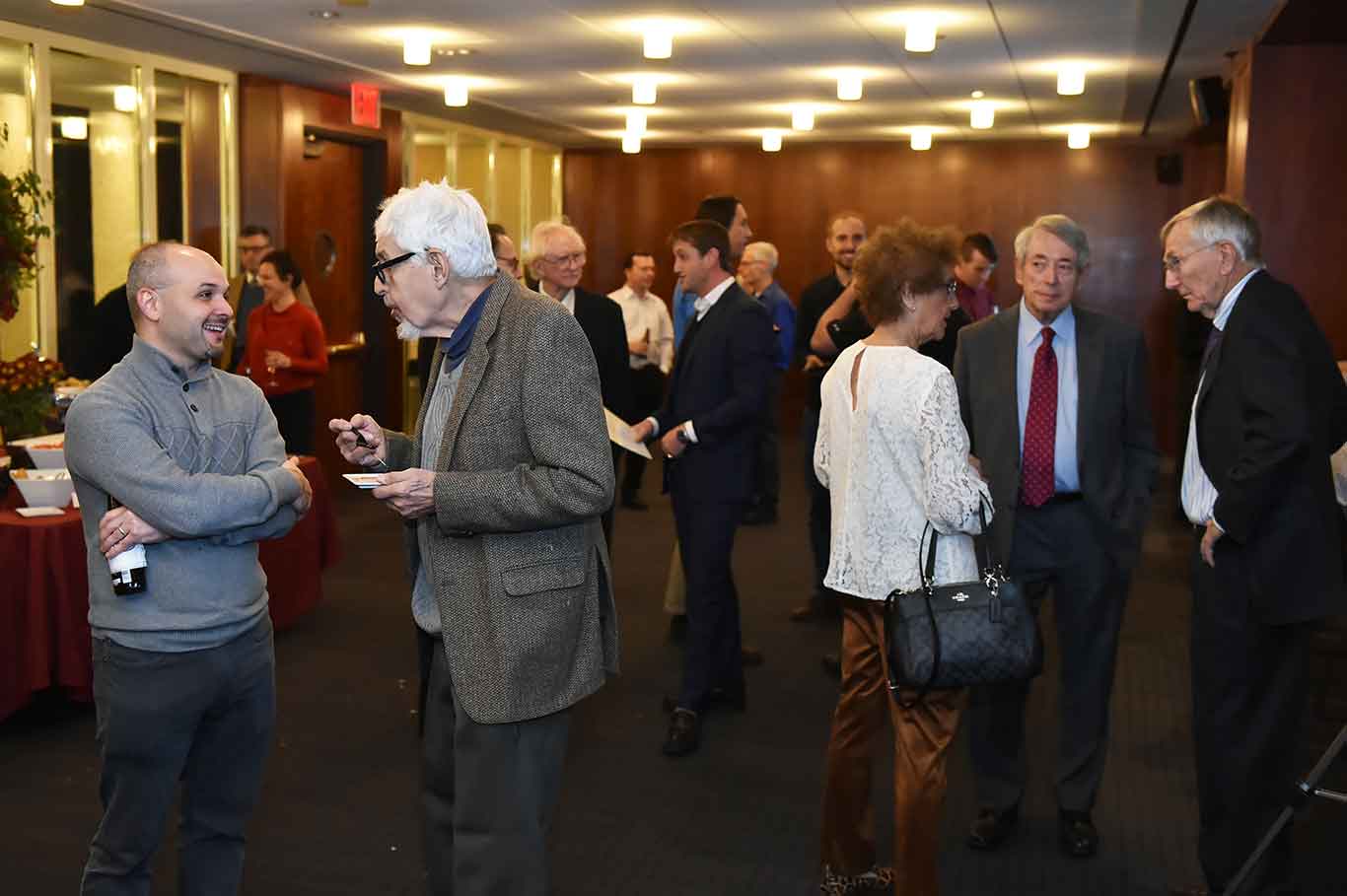
Brian Rose, Ph.D., a professor of communications who was director of the award following Auster, called him a treasured colleague whose good judgment and empathy were valued on both campuses.
“He brought a tremendous sense of intellectual energy and wide historical background to his media classes, which clearly engaged several generations of students at Fordham. Al’s warmth, generosity, and good humor will be sorely missed,” he said.
Jacqueline Reich, Ph.D., a former professor of communications and media studies who is now dean of the School of Communication and the Arts at Marist College, echoed Rose and said that Auster was fundamental in bringing the Sperber Prize to Fordham.
“His tireless advocacy and devotion to the program was so appreciated by the Sperber family in Anne Sperber’s memory,” she said, noting that he was a charming, gentleman and devoted teacher.
“One of my favorite quotes about him from a student evaluation was “‘I wish he was my grandpa.’”
In 2008, Auster organized, along with Paul Levinson, Ph.D., a conference dedicated to the HBO show The Sopranos. Levinson called him a “one-of-a-kind professor and human being who had a heart of gold, a smile that would light up a room, and an encyclopedic knowledge of everything he taught and talked about.” Levinson recalled asking Auster at the last minute to serve as an associate chair of the department at the Lincoln Center campus. Auster didn’t hesitate, he said.
“I would call him anytime I had an issue that needed discussion, and he always took the call, including at night and weekends. I knew I’d miss him when he retired, and I did. I know now I’ll miss him very much more,” he said.
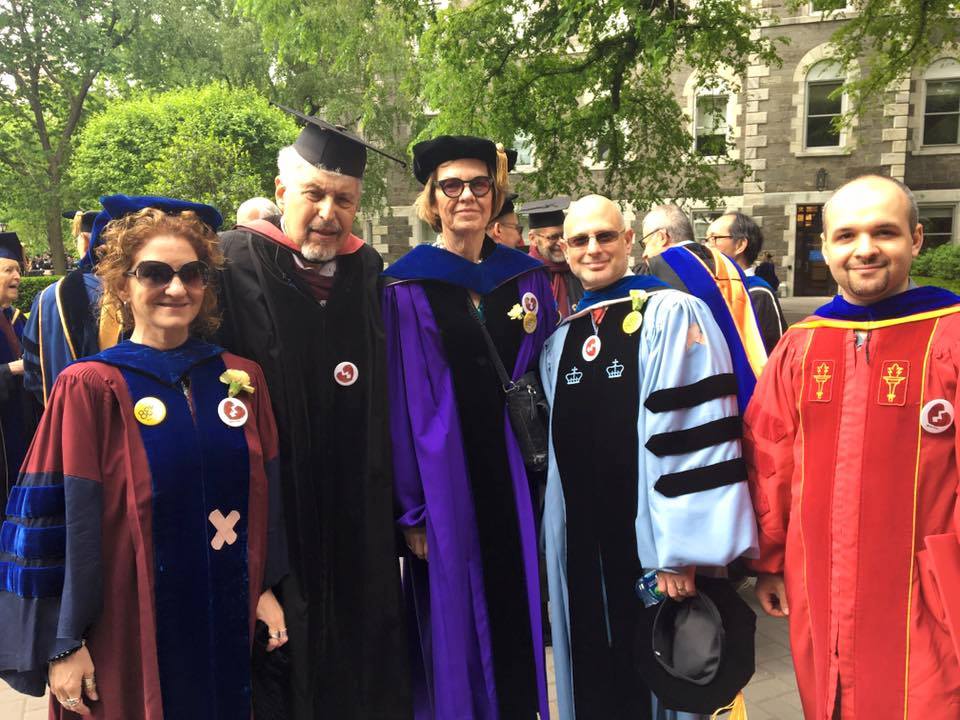
Photo courtesy of Gwyneth Jackaway, left
Thomas McCourt, Ph.D., a retired professor of communication and media studies, credited Auster with making him feel welcome when he first moved to New York City and was feeling out of his league.
“He had a wonderfully dry sense of humor and keen sense of the absurd. We spent hours and hours talking about jazz guitarists!” he said.
“I learned that a number of junior faculty in the department held an informal poll as to which senior colleague they would like to accompany on a cross-country road trip, and Al was the hands-down winner because he had so many great stories to tell. Al was the definition of a mensch.”
In 2016, Auster was recognized for his service at the University with a Bene Merenti medal. At the ceremony, he was lauded for being “a classic New Yorker, exemplifying the wit and heart of the city.” His citation praised him for his significant contribution to his field and to Fordham:
“Dr. Auster’s significant body of work details the history and impact of film and television on the American landscape. His wide-ranging interests are reflected in his many books and articles that have helped shape critical debates on how politics and media interact. In his studies of film and TV programming focusing on the Vietnam War, Dr. Auster has portrayed the complexities and contradictions of creators as activists in an industry typically focused on ratings and financial results,” the citation read.
“Through the years, numerous students have attested to the spirit of inquiry and openness that distinguishes his teaching. His classes provide a broad sense of context in which to address the fundamental questions of philosophy and ethics in past and present media. In both his life and work, Dr. Auster reflects the best aspects of Fordham and New York City.”
Auster’s wife Susan Hamovitch said he had recently begun working on a memoir that he called bubbenmeises, an intentionally misspelled Yiddish word that he defined as “Referring to a number of meanings: a false story, a story that is so eccentric as to be meaningless, or a story intended to divert from the real story. But are more than that because they have defined me [him]and my family.”
In the course of working on it, he’d realized that he was profoundly affected by the Holocaust, which resulted in the murder of his grandmother, aunts, and uncles. After graduating from City College, he worked in radio, for the Canadian Broadcasting Company and WBAI in New York City. It didn’t pay well enough though, she said, so he reluctantly went back to school to earn a Ph.D. in history. He would become a student of Hitler, Stalin, and the Jim Crow era of the Deep South, she said in remarks she delivered in a eulogy.
“His jam though, was to probe historical themes as contemporary American culture, mainly movies, portrayed them,” she said.
“How did film portray the Holocaust? The War in Vietnam? Jewish mores? For his graduate thesis, the question was, which of Hollywood’s stars were diehard suffragists?”
Auster’s life can be summed up as passionate and emotional, she said.
“He breathed the history of this country, from the Suffragist movement to race relations, from John Ford to Jerry Seinfeld, with pride, annoyance, rage and love, I suspect due to the bubbenmeises he’d lived through,” she said.
“He approached his end as he had his life, with kindness, discipline, and a sense of responsibility. He was an extraordinary man.”
Funeral services will be held Friday, April 1, at 11 a.m. at the Kerhonkson Synagogue in Kerhonkson, New York. The service will be streamed live on Zoom. His wife Susan Hamovich will be sitting shiva on Sunday, April 3 and a shiva minyan at 3 pm. Anyone who would like to share memories of professor Auster are asked to e-mail them to Susan at [email protected]. In lieu of flowers, the family asks that you consider making a donation to the Met Council on Housing and/or to Kolot Chayeinu.
]]>Ironically, the award was given to Hersh for a book— Reporter: A Memoir (Knopf, 2018)—that he never planned to write.
An investigative journalist who’s penned 10 books about topics as varied as Henry Kissinger, John F. Kennedy Jr., and the Gulf War, Hersh said Reporter was actually the result of his failure to finish what would have been his 11th book. After decades cultivating sources deep within the American military and intelligence community, he signed a contract and got a big advance to write a book about former vice president Dick Cheney. Then his sources got cold feet.
“I began to share some of the stuff I was going to say, and they said, ‘We’re going to go to jail if you do that,’” Hersh said at the award ceremony, held at the Lincoln Center campus.
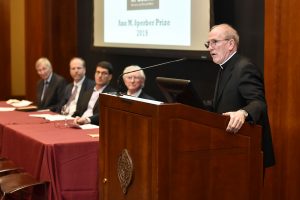
“I’d gotten a huge contract and I’d worked for years on their money, and said, ‘I’m dead.’ [The publisher] said, ‘Well, you can do one of two things. You can go to the gulag and start paying us a dollar a week, or do a memoir.’ So that’s why I did it. Not for mercenary reasons, but to save my life,” he said, laughing.
Joseph M. McShane, S.J., president of Fordham, lauded Hersh, whose work also includes a 2004 bombshell piece about U.S. military abuse at the Abu Ghraib prison in Baghdad, for being someone who educates the public through his life’s work. Father McShane called Reporter “a story of incredible strength, and incredible courage that is told with a very critical but loving eye.”
“There is one phrase that I think probably characterizes your life, and it is this: There is no hunger like the hunger of truth,” he said to Hersh.
“Once you have tasted it, it creates a longing, and you have spent your life really giving into that longing.”
Andrew Meier, chairman of the department of journalism at the New School, said at the ceremony that he read Reporter in one night and it left him mesmerized, stunned, and eternally grateful to Hersh for his work. He called it a landmark of our generation. When he reviewed the book last summer for Book Forum, he dubbed it a “miracle.”
“Hersh has done more than stand witness; he has done the hard digging, again and again and again, and even now, he’s still digging, five decades and counting of scoops,” he said.
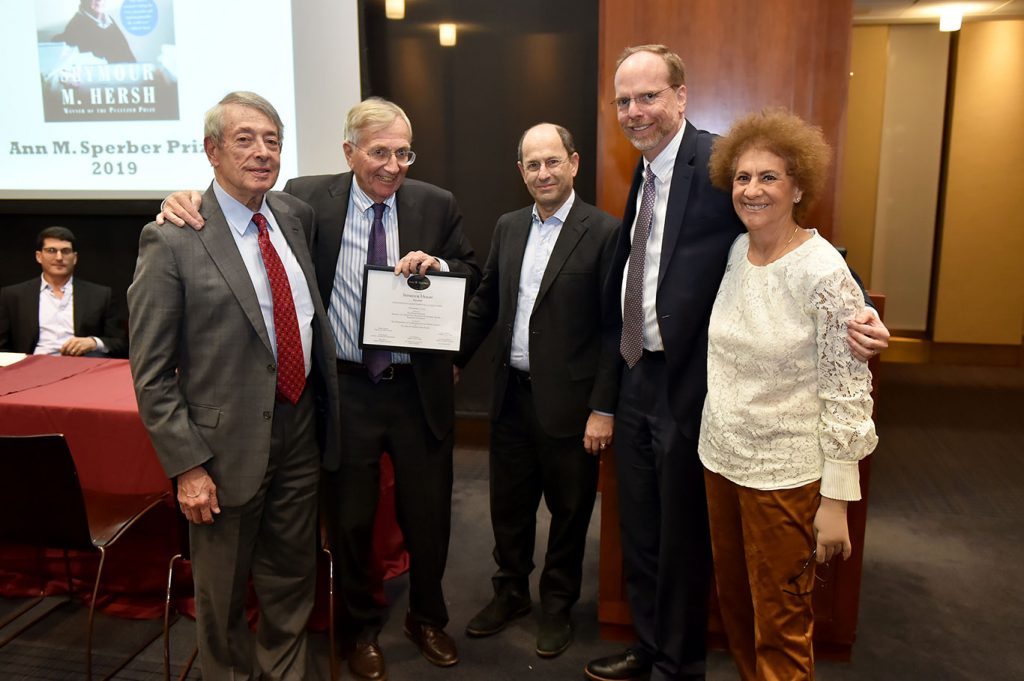
In his acceptance remarks, Hersh also reflected on the lessons he learned as a young reporter covering crime in Chicago. Some were harsh ones about the pervasiveness of racism, even within journalism, such as when he was instructed by an editor to “cheap up” a story about the death of a family when it was revealed they were black.
He also recalled a time when he was instructed to self-censor a story about police misconduct to protect a good relationship with authorities. And in a knock at the current obsession with breaking news first, he also said he learned you could be a better reporter even if you were the second one to write about something.
Perhaps most relevant to today’s current events, he said, is the value of the sources that he’s been able to cultivate over the years. As an example, he singled out Major General Antonio M. Taguba, who sacrificed his career in the military when he leaked a report on Abu Ghraib to Hersh.
“Over the years I’ve learned that the people to find are those people on the inside who believe in being there even now, in this government, who believe the best thing they can do is the best they can. Who are inside, in a sense, and are not afraid to talk about things that go wrong, and take a chance,” he said.
He also had advice for aspiring journalists in the audience.
“If you want to do better in life and reporting, as a journalist, do read before you write,” he said. “Have enough information so you can do a narrative. That means do a lot of work.”
The Sperber Prize was established in 1999 by Liselotte Sperber to honor the memory of her daughter Ann, who wrote the definitive biography of Edward R. Murrow, Murrow: His Life and Times (Freundlich, 1986).
Past winners have included New York Times columnist Charles M. Blow, for his memoir Fire Shut Up in My Bones (Houghton Mifflin Harcourt, 2014), and Robert Miraldi, who won in 2014 for his biography of Hersh, Seymour Hersh: Scoop Artist (University of Nebraska Press, 2013).
The prize is administered by Fordham’s Department of Communication and Media Studies.
]]>The award, which was presented in a ceremony at the Lincoln Center campus, was given for Gottlieb’s memoir, Avid Reader: A Life (Farrar, Straus and Giroux, 2016). It was accepted by Gottlieb’s wife, Maria Tucci. During his considerable career, Gottlieb served as editor-in-chief of Simon & Schuster, Alfred A. Knopf, and The New Yorker. Considered one of the greatest editors of the mid-to-late 20th century, he worked with the era’s leading authors—John Cheever, Salman Rushdie, Doris Lessing, Toni Morrison, Janet Malcolm, and Robert Caro, to name a few.
Jonathan Crystal, Ph.D., Fordham’s associate vice president and associate chief academic officer, called it an especially relevant tome to be honored amidst a crowd of book lovers.
“I think in the academic world, you’ll find many of us who identify completely with Robert Gottlieb when he writes ‘From the start, words were more real to me than real life, and certainly more interesting,’” he said.
“It was fascinating for me to see how editors work with authors to, as he put it, ‘Edge a book closer to its platonic self.’ I felt like I was peeking behind a curtain and getting a glimpse of this mysterious process.”
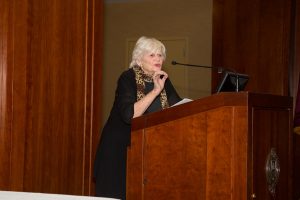
Patricia Bosworth, a contributing editor for Vanity Fair and a member of the Sperber Prize jury, hailed Avid Reader as a “buoyant memoir of a remarkable career,” and spoke fondly of her experience working with Gottleib on Diane Arbus: A Biography (Knopf, 1984).
She recalled that although she had earned the trust of Arbus’ brother Howard Nermorov, Arbus’ estate refused to work with her or let her reproduce the late artist’s photography.
[Gottleib] said, ‘It doesn’t matter. You’re going to write about the photographs, describe them, find out how she took the pictures. Photographs will not matter,’” she said.
“Once he said that to me, it gave me confidence. I was really worried about it before.”
He taught her that work is more fun than fun, she said.
“Digging deep into something can be one of the most exciting things a writer and editors can do—discovering collecting, shaping. Bob said in his book, that ‘Work is my natural state of being.’ That’s what I learned from him, so I’m forever grateful,” she said.
In remarks delivered on his behalf by Tucci, Gottleib joked that he assumed that, having edited biographies of George Balanchine, Charles Dickens, and Sarah Bernhardt, tackling a book about himself would earn him ridicule for engaging in an “act of nervy self-indulgence.” He said he was thrilled that the prize was being given for a book that is really about books.
“I don’t know which is more gratifying: helping a writer make his or her book even better than it already is, or watching your enthusiasm for a writer or a book spread out into the world at large. And they’ve been paying me to do these things for 62 years now!” he said.
“I’ve always believed that editors should do their work invisibly, without attention being called to them. And yet I can’t pretend I’m indifferent to seeing our work honored, so I’m happy to accept this tribute not in my name only, but in the name of my whole club.”
The Sperber Prize was established by Liselotte Sperber to honor the memory of her daughter Ann, who wrote the definitive biography of Edward R. Murrow, Murrow: His Life and Times (Freundlich, 1986). It is administered by Fordham’s Department of Communication and Media Studies.
]]>